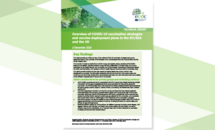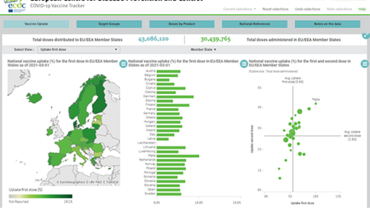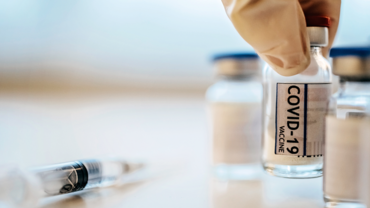Partial COVID-19 vaccination, vaccination following SARS-CoV-2 infection and heterologous vaccination schedule: summary of evidence
This document provides a review of evidence on three topics of interest (effectiveness of partial vaccination, immunogenicity and effectiveness of vaccination for previously infected individuals and safety and immunogenicity of heterologous schedules) to inform ongoing decision-making in relation to national vaccination policies and strategies in the European Union and European Economic Area (EU/EEA) countries.
Executive Summary
Key messages
This document provides a review of evidence on three topics of interest (effectiveness of partial vaccination, immunogenicity and effectiveness of vaccination for previously infected individuals and safety and immunogenicity of heterologous schedules) to inform ongoing decision-making in relation to national vaccination policies and strategies in the European Union and European Economic Area (EU/EEA) countries.
Partial vaccination
-
Available data, across different population groups and SARS-CoV-2 variants of concern (VOCs), confirm that the protection against asymptomatic and symptomatic infection and severe disease conferred by two vaccine doses (Comirnaty, Spikevax and Vaxzevria) is significantly higher than with partial vaccination (i.e. one dose of a two-dose regimen). Evidence is limited on the long-term effectiveness of partial vaccination.
-
Preliminary evidence from some studies indicates that individuals who are partially vaccinated are less protected against symptomatic infection with the B.1.617.2 (Delta) VOC than against the B.1.1.7 (Alpha) VOC, regardless of the vaccine type. However, full vaccination provides nearly equivalent protection against the Delta to that for the Alpha VOC.
-
This supports ECDC’s previous recommendation that, in the context of increasing circulation of the Delta VOC, full vaccination should be achieved as early as possible and the second vaccine dose be administered after the shortest possible interval, with priority given to population groups at highest risk of severe outcomes following SARS-CoV-2 infection.
Previously infected individuals
-
Studies of single-dose regimens of Comirnaty, Spikevax and Vaxzevria in previously infected individuals indicate antibody and cellular immune responses are comparable to naïve individuals who complete the two-dose regimen. However, data on the long-term duration of protective immunity are sparse.
-
Caution must be exercised in translating immunogenicity data into protection from COVID-19 clinical outcomes. No evidence is currently available on clinical endpoints, such as risk of laboratory-confirmed infection and symptomatic disease, for previously infected individuals receiving just one dose of a vaccine intended as a two-dose regimen.
-
Given the current evidence gaps, as a precaution, consideration should be given to the continued administration of a two-dose regimen, as per EMA authorisation, particularly for those individuals at greatest risk of severe outcomes following SARS-CoV-2 infection.
Heterologous vaccination
-
Evidence from studies on heterologous (‘mix and match’) vaccination suggests that the combination of Vaxzevria and mRNA vaccines induces a robust humoral response against SARS-CoV-2 and elicits a higher T-cell response than homologous combinations. Although increased mild-to-moderate systemic reactogenicity was observed after administration of the second dose, heterologous regimens were generally well tolerated.
-
Several EU/EEA countries are currently using ‘mix and match’ schedules, mainly with an mRNA vaccine (Comirnaty or Spikevax) following a first dose of Vaxzevria, especially to complete the vaccination course in the event of severe reactions after the first dose or for other precautionary reasons based on national protocols. Current evidence provides scientific grounds to expect these ‘off-label’ approaches to be safe and elicit a satisfactory immune response.
-
While research is ongoing to provide more evidence on long-term safety, duration of immunity and effectiveness, the use of heterologous schedules may offer flexibility in terms of vaccination options, particularly to mitigate the impact on the vaccine rollout should a vaccine product not be available, or if it is discontinued or paused.








